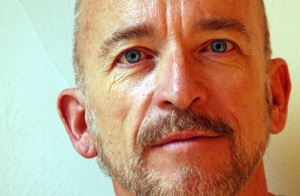I fell in love with poet and author Mark Doty when I read his memoir “Heaven’s Coast,” about the relationship and illness of then  partner Wally, who succumbed to AIDS related complications. Through his memoir and poetry, Doty offers a universal view on romantic relationships that transcends sex, gender, economic status, race and sexual orientation. His observations express emotions inherit to struggle and love, and he has the amazing ability to put feelings of the gut into words, which reach out from the pages into us as readers.
partner Wally, who succumbed to AIDS related complications. Through his memoir and poetry, Doty offers a universal view on romantic relationships that transcends sex, gender, economic status, race and sexual orientation. His observations express emotions inherit to struggle and love, and he has the amazing ability to put feelings of the gut into words, which reach out from the pages into us as readers.
I chose Doty in honor of not only National Poetry Month, but also to recognize that gay rights are human rights and in hope of a day where there will be a level playing field for all.
Brilliance by Mark Doty
Maggie’s taking care of a man
who’s dying; he’s attended to everything,
said goodbye to his parents,
paid off his credit card.
She says Why don’t you just
run it up to the limit?
but he wants everything
squared away, no balance owed,
though he misses the pets
he’s already found a home for
-he can’t be around dogs or cats,
too much risk. He says,
I can’t have anything.
She says, A bowl of goldfish?
He says he doesn’t want to start
with anything and then describes
the kind he’d maybe like,
how their tails would fan
to a gold flaring. They talk
about hot jewel tones,
gold lacquer, say maybe
they’ll go pick some out
though he can’t go much of anywhere and then
abruptly he says I can’t love
anything I can’t finish.
He says it like he’s had enough
of the whole scintillant world,
though what he means is
he’ll never be satisfied and therefore
has established this discipline,
a kind of sever rehearsal.
That’s where they leave it,
him looking out the window,
her knitting as she does because
she needs to do something.
Later he leaves a message:
Yes to the bowl of goldfish.
Meaning: let me go, if I have to,
in brilliance. In a story I read,
a Zen master who’d perfected
his detachment from the things of the world
remembered, at the moment of dying,
a deer he used to feed in the park
and wondered who might care for it,
and at that instant was reborn
in the stunned flesh of a fawn.
So, Maggie’s friend-
is he going out
into the last loved object
of his attention?
Fanning the veined translucence
of an opulent tail,
undulant in some uncapturable curve,
is he bronze chrysanthemums,
copper leaf, hurried darting,
doubloons, icon-colored fins
troubling the water?





